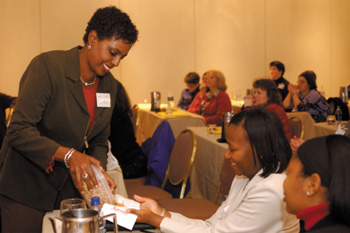| About Us | Key Sites | Finders | Intranet | Search | Help | Eskind Library | Eskind Digital Library | VU |
|
||||||||||
|
|
Ethiopian Jewish immigrants share stories, outreach at Vanderbilt-sponsored conference December 20, 2002  A group of Jewish Ethiopians were in Nashville recently to describe community outreach work to prevent and treat emerging Western diseases like diabetes and obesity in their new culture of Israel. Registered nurses, social workers, dentists, and fitness experts were part of the group invited to a conference on chronic disease management for culturally diverse and immigrant populations, hosted by the Vanderbilt School of Nursing and the Vanderbilt University Diabetes Center. The health care providers explained the Tene Briut Model, implemented to educate the Ethiopian immigrant population in Hadera, Israel on proper nutrition and fitness in an attempt to halt the progression of diabetes and other diseases. The main objective of the model is to provide the Ethiopian immigrants with the knowledge and skills to enable them to make healthy lifestyle choices to prevent diseases associated with westernization. Since the first wave of immigration in 1984, more than 80,000 Ethiopian Jews have settled in Israel. The once-farmers left their rural lives that were filled with necessary physical activity to reside in urban areas with public transportation and supermarkets. The immigrants also left behind healthy eating habits in their native Ethiopia. Processed food high in fat and sugar replaced natural grains and vegetables. “Most of the immigrants were farmers, growing grains such as teff (a type of wheat),” explained Anania Inbal, a nutritionist with the Tene Briut project who immigrated to Israel in the 90s. “All food was natural. We only ate meat on Shabbat and holiday.” Today, 17 percent of the Ethiopian Jewish population in Israel has diabetes, a disease barely present in the ethnic group prior to the immigration. As diabetes, high blood pressure, and obesity rose sharply in the Israeli community, traditional health care workers noticed that cultural differences hampered the success of traditional educational efforts in the education and prevention of disease. The Tene Briut team, based at the Endocrine and Diabetes Unit of the Hillel-Yaffe Medical Center in Hadera, responded with an infiltration into the community. The team, comprised of fellow immigrants and people familiar with the culture and language, sponsors lecture groups, walking clubs and cooking classes to promote a healthy lifestyle. The project is helping to bridge the different cultures of Ethiopia and Israel. Even the translation merges the two cultures — “Te’ne” means health in Amharic, the official Ethiopian language, and “Briut” means health in Hebrew. The Tene Briut team was invited to the conference by the School of Nursing, which serves Nashville’s increasing immigrant population at various clinics like the Vine Hill Clinic. The clinic occupies the second floor of the Vine Hill Community Center at the corner of the recently renovated Vine Hill Homes. Located in an underserved and isolated area with a large population of elderly and disabled, the clinic opened in 1990 with a grant from the Kellogg Foundation. Since the opening, the area has seen a dramatic increase in its immigrant population. In addition to a large Hispanic population, Nashville has the largest population of Kurds in the United States (about 5,000), 1,800 to 2,200 Somalians, and a significant number of Sudanese. “It was a privilege to be able to host the study visit from the Tene Briut project,” said Linda Norman, D.S.N., senior associate dean of Academics at the School of Nursing. “The insights we gained from the Tene Briut health care providers were invaluable. We were able to learn from them about the trials of leaving their homeland and the problems they face in trying to provide health promotion services to their fellow countrymen in Israel. We hope to continue our relationship with this team.” |
Also in this issue:
|
|
[ VUMC Home | About Us | Key Sites | Finders | Intranet | Search | Help | Eskind Library | Eskind Digital Library | VU ] Copyright © 2008, Vanderbilt University Medical Center |